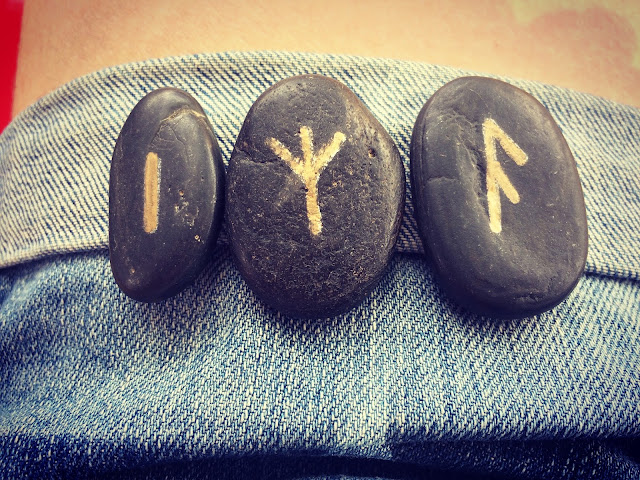This morning I decided to take the day off to spend with my kids, as tomorrow they all begin once again that spiral dance of the school cycle, with my son just embarking on his own as he takes his first steps into Kindergarten. So I was sitting at the kitchen table nursing my second cup of coffee and continuing my journey through Futhark (by Edred Thorsson, a.k.a. Stephen Flowers). I paused when my husband came to the table, and pulled out the Earthbound Oracle; he pulled a card, I pulled a card. I drew Luna, that perfect, pale circle. I thought how fitting it was to pull this moon after having drawn two very closely aligned Tarot cards for the week. More water, cycles, and emotional food for thought.
I kept reading.
I read Thorsson's discussion of the cosmic void from which the runic system and its energies descend, about how Odin, Vili, and Ve gave form and structure to those energies in the creation of the multiverse. And as I flipped the page I saw a diagram of the futhark pattern of manifestation, a series of concentric circles expanding out from a central point, a core out of which the runes arrange themselves in linear patterns. As I examined the diagram it touched on a dream I had back in May, and I opened my journal to find the entry I had written about it.
My dream was not obviously runic. I had it at a time when I was struggling a bit with how to incorporate two different religious/spiritual traditions and cosmologies into my personal practice - could I integrate Santería and the Northern Tradition harmoniously? Would I, or should I, choose only one? In many ways I have come to understand that Santería has both brought me more fully to the Northern Tradition, and has helped me contextualize it. I understand Northern cosmology more intimately because of my understanding of Lucumí cosmology. I understand and relate to the deities as individual energies and unique personalities because of my relationships with the Orishas. I don't mix and match faiths - I believe in tradition, and value depth above breadth. Santería was not a religion I had sought out - it became a part of me through my cohabitation with the saints over a period of a decade or more, and via my husband. One day I realized that the saints were alive within me, a part of my family, guides, and protectors, and teachers, and friends. It doesn't get much more organic than that. This was the point at which I formally entered into the mystery religion by way of initiation, and has been, and continues to be, a source of great sustenance for me.
Through ancestral veneration and exploration I more fully began to explore the Northern Tradition as a way of connecting to my Scandinavian/Germanic forebears (I wrote about this in a previous post). And as I delved into the Eddas and the Northern cosmology, the runic system, I found so much richness and satiation. It grew and expanded in my heart, mind, and spirit, such that it became far deeper than simply "honoring history." And yet I found myself worrying about whether or not I could, or should, practice two religions at the same time. Was it right? Was it doable? Could I fully embrace both without sacrificing either? My intellect was struggling, but my heart told me that it was my own limited, "human" thinking that was raising a fuss over compartmentalization; my heart told me that there was no conflict here.
While my dream was not runic, per se, it mirrored this futhark pattern of manifestation. In my dream I felt the presence of Odin, and I could see what seemed like a picture of the cosmos, as if I were in outer space. Concentric circles of cloud-like material surrounded a central point, like the Earth, and the idea was that the image before me was showing how throughout time old gods and goddesses would slowly dissipate and new gods and goddesses would develop to take their places, but that ultimately they were all part of the same force. There was great comfort in that. These deities and entities exist both sequentially and simultaneously in time.
 |
| A rough depiction of my dream |
In the end, the universe, the experience of "being," is so dynamic. Insofar as our own progress is concerned, we are often our own worst enemies, placing barriers where none exist, projecting our own limitations onto divine forces, creating rules of engagement that are ultimately fabrications of our own attempt at understanding the Great Mystery (or putting that mystery in a tidy box)*. As a human, I acknowledge that I don't know much at all, and that I do fear and worry from time to time. But when all is said and done, I am open to receiving that mystery, even when I can do nothing but simply accept it.
*I don't believe in picking and choosing the "favorable" parts of a religious tradition, and throwing out the rest, nor do I (generally speaking) support the practice of honoring a patchwork pantheon of various deities outside of the context of their history, culture, and original traditional framework. There is too much room for cultural appropriation there. I do, however, believe that there is far more flexibility in the spiritual world than humans tend to acknowledge or allow for.




